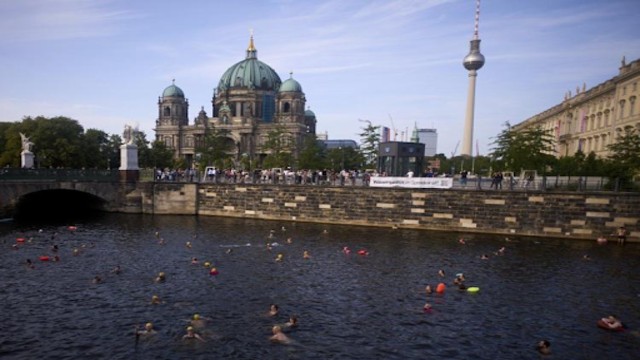
People swim in the river Spree to demand the lift of the hundred years old swimming ban at the river in front of the Berlin Cathedral and the TV Tower in Berlin, Germany, Tuesday, June 17, 2025. AP Photo
Berliners are diving back into their history—literally. For the first time in nearly a century, about 200 residents jumped into the Spree River this week, not just to cool off, but to make a bold statement. They want swimming in Berlin’s urban river to be legal again.
Making a Splash for a Cause
The swimmers gathered near Museum Island in Berlin’s Mitte district. Their dive wasn’t just a spontaneous summer stunt—it was an organized protest.
Behind the event is Fluss Bad Berlin, a group campaigning to reopen a stretch of the river to public swimming. To sidestep the longstanding ban, they officially registered the swim as a demonstration. Their message? The river is clean enough—and the city is ready.
Why Swimming Was Banned
Swimming in the Spree has been outlawed since 1925. At the time, the river was so polluted that getting in the water could make people seriously ill. Many Berliners, especially those without indoor plumbing, relied on the river for basic hygiene. But when pollution levels became hazardous, authorities shut down all city-center river pools.
Water Quality of Berlin's Spree River Has Changed
Jan Edler of Fluss Bad Berlin believes it’s time to rethink the old rule. He says water quality has improved significantly over the past decade. Most days, the Spree meets swimming standards—except after heavy rains that lead to overflow pollution.
The group hopes to open up a nearly 2-kilometer canal loop for public swimming. This section, which flows along the southern edge of Museum Island, doesn’t see much boat traffic and would be safer for recreational use.
City Officials Are Listening
Berlin's Mitte district officials have shown interest in the idea. A pilot project could begin as early as 2026. While some challenges remain—such as protecting historic riverbanks, ensuring safety, and managing infrastructure—momentum is building.
District councilor Ephraim Gothe recently told the German press that while many aspects need to be clarified, he’s optimistic about the plan.
Other Cities Are Already Doing It
Berlin’s neighbors are diving in too. Paris reopened the Seine for Olympic athletes last year and plans to allow public swimming this summer. Vienna has safe spots in the Danube Canal, Basel encourages bathing in the Rhine, and Amsterdam has designated canal zones for swimmers.
Berlin, however, has kept its ban firmly in place for 99 years.
An Urban Need in a Heating World
With summer temperatures rising and public pools overflowing, the city’s residents are craving more ways to cool off. Edler sees access to urban swimming not just as a convenience but as an issue of fairness.
“Cities are getting hotter,” he said. “Not everyone can leave town on a hot day. They deserve a space to cool down.”
For now, Berlin’s swimmers are making waves in more ways than one—pushing for cleaner water, healthier cities, and a right to dive back into their urban rivers.















